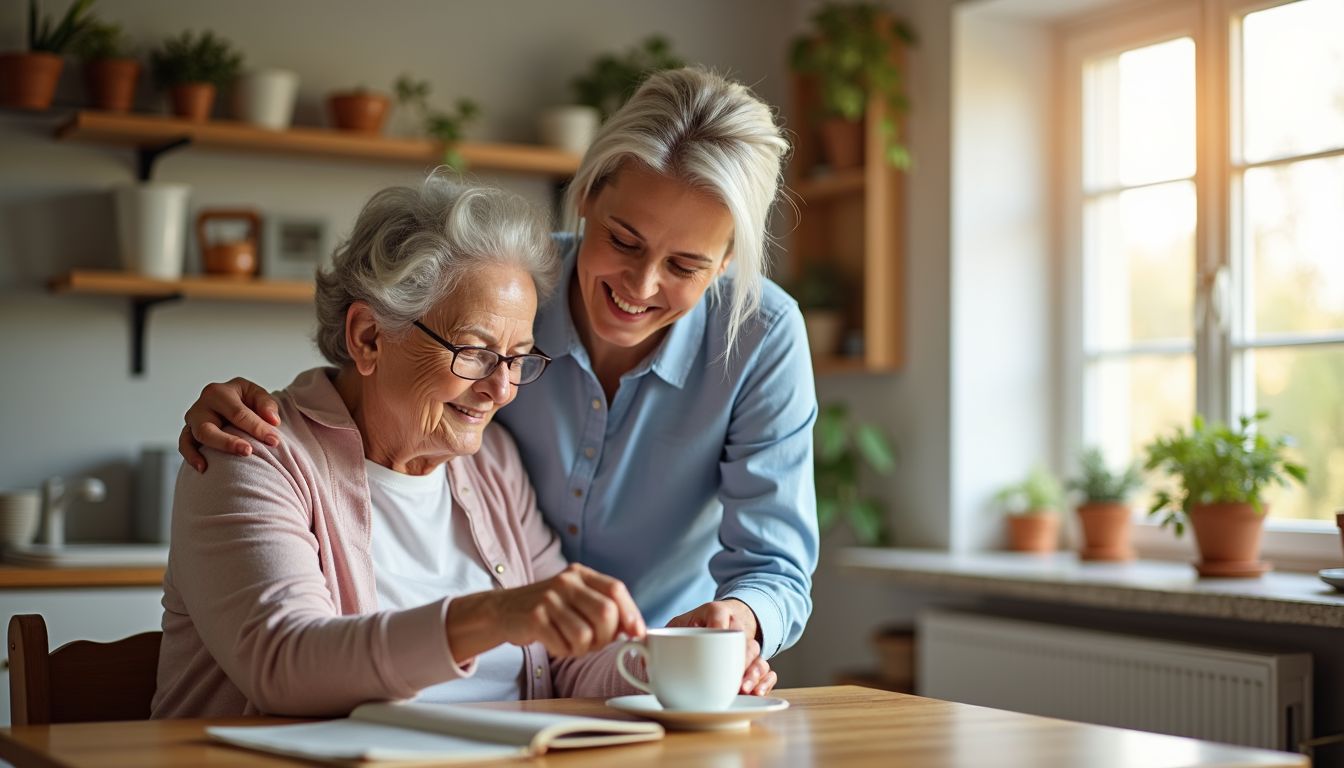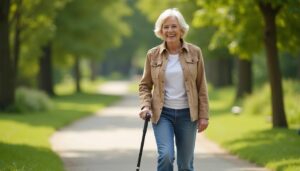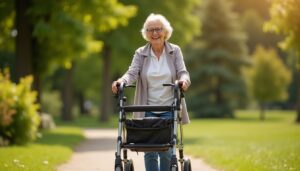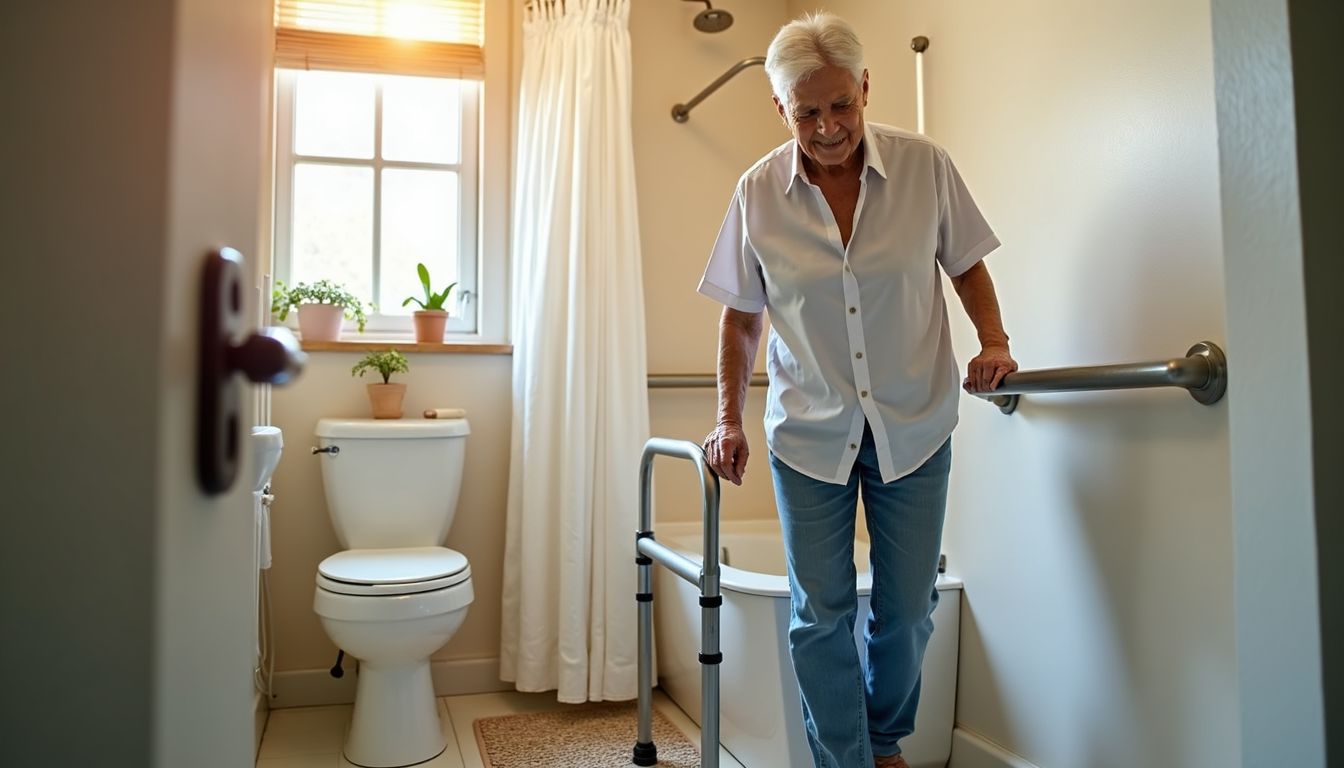When thinking about how to help aging parents, start by making small, meaningful changes at home that promote safety and comfort. Consider simple upgrades like grab bars, slip-resistant mats, and proper lighting — all of which are part of building a senior-friendly home. Ensuring bathroom safety is also essential — check out our guide on bathroom safety for seniors to reduce fall risks. For daily well-being, proper medication management helps maintain independence and peace of mind. You can also explore trusted advice from the National Institute on Aging to support your loved ones in aging safely and confidently at home.
Many families struggle to balance safety with freedom, often feeling unsure about how much assistance to provide. The goal is not to take over, but to create an environment where seniors can live safely, comfortably, and confidently.
In this guide, we’ll explore practical tools, home adjustments, and lifestyle strategies that help seniors stay independent. From mobility aids like scooters and walkers to bathroom safety devices and smart reminders, these tips empower both seniors and caregivers to enjoy a better quality of life together.
Understanding the Importance of Independence
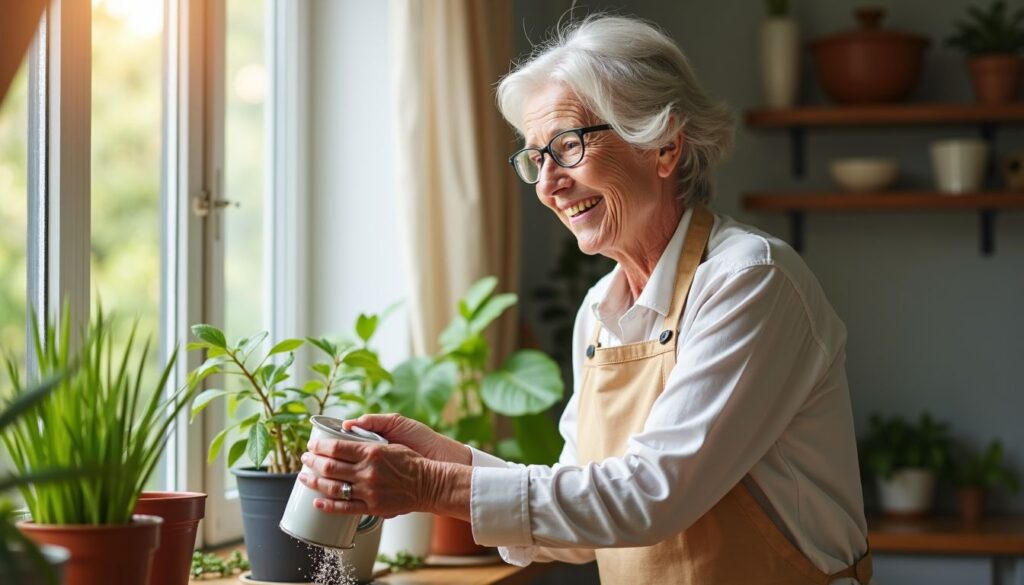
Independence is not just about doing tasks on your own—it has far-reaching effects on a senior’s physical, mental, and emotional well-being. Maintaining autonomy helps seniors feel in control of their lives, reduces stress, and promotes a healthier, more fulfilling lifestyle.
a) Physical Benefits
-
Staying active and performing daily tasks independently keeps muscles, joints, and balance in good condition.
-
Seniors who maintain mobility are less likely to experience falls or other health complications.
-
Activities like walking, reaching, or self-care routines contribute to overall strength and endurance.
b) Mental Benefits
-
Making decisions and managing one’s own routine stimulates the brain and enhances cognitive function.
-
Engaging in daily activities independently prevents boredom and reduces the risk of depression.
-
Seniors who feel capable are more motivated to stay involved in hobbies, social interactions, and learning new skills.
c) Emotional Benefits
-
Independence fosters self-esteem, confidence, and a sense of purpose.
-
Seniors who maintain control over their environment experience less frustration and anxiety.
-
Feeling respected and valued boosts emotional health and strengthens family relationships.
d) Impact on Caregivers
-
When seniors are more independent, caregivers experience reduced stress and burnout.
-
Caregivers can focus on providing guidance and support rather than constant supervision.
Pro Tip: Encouraging independence doesn’t mean leaving seniors unsupported. It’s about finding the right balance between safety and autonomy, using tools, routines, and gentle assistance where necessary.
Tools and Technologies That Make Independence Possible
Modern tools and assistive devices can significantly enhance a senior’s independence at home. These solutions help seniors move safely, manage daily tasks, and stay connected, while giving caregivers peace of mind.

a) Mobility Aids
Mobility scooters and walkers are essential for seniors who need support moving around their home or neighborhood. These devices reduce fatigue, improve circulation, and help seniors feel confident in performing daily activities on their own. For detailed options, check out our guide on Best Mobility Scooters for Seniors. According to the CDC, safe mobility is key in preventing falls, which are a leading cause of injuries among older adults.
b) Bathroom Safety Devices
Bathrooms can be risky for seniors, but simple tools like grab bars, shower chairs, and bedside commodes make a huge difference. These devices allow seniors to bathe and use the restroom independently and safely. Learn more about the best options in our reviews for Shower Chairs for Seniors and Top 5 Bedside Commodes in 2025. The NIH Senior Health site emphasizes that installing such safety features is one of the most effective ways to prevent falls at home.
c) Smart Home Devices
Technology can make independent living easier. Smart medication reminders, emergency alert systems, and voice assistants help seniors stick to daily routines while providing instant assistance if needed. For example, smart pill organizers can alert caregivers when a dose is missed. Check our guide on Top Smart Pill Organizers for Seniors to find devices that suit your needs.
d) Daily Living Aids
Small tools like reach extenders, ergonomic kitchen utensils, and adaptive devices make everyday tasks easier and safer. These items reduce strain, prevent accidents, and allow seniors to continue performing routine chores independently. For more tips on modifying the home for aging in place, see this helpful AARP guide.
Pro Tip: Combining mobility aids, bathroom safety devices, and smart reminders creates a holistic setup that maximizes independence while minimizing risks.
Encouraging Safe Mobility and Self-Care Habits
Helping seniors maintain independence isn’t just about tools—it’s also about building safe habits and routines that keep them active, confident, and healthy.
a) Daily Exercise and Stretching
Regular movement improves strength, flexibility, and balance. Encourage simple exercises such as walking indoors, stretching, or light strength training. These routines reduce the risk of falls and help seniors stay mobile. The CDC’s guide on physical activity for older adults provides safe exercises tailored for seniors.
b) Safe Movement Around the Home
-
Teach seniors to use handrails on stairs and walkways.
-
Encourage using mobility aids like walkers or scooters when necessary.
-
Keep frequently used items within easy reach to avoid bending or overreaching. For practical product options, see our Best Mobility Scooters for Seniors guide and Shower Chairs for Seniors review.
c) Independent Self-Care
-
Support seniors in maintaining personal hygiene, grooming, and dressing on their own.
-
Adaptive devices, like long-handled sponges or easy-grip utensils, can make these tasks easier.
-
Using bedside commodes can make nighttime bathroom trips safer and more independent—learn more in our Top 5 Bedside Commodes in 2025 review.
d) Encourage Consistency and Routine
-
Establish predictable daily routines for meals, medications, and activities.
-
Consistent habits reduce confusion and increase confidence, helping seniors feel more in control of their day.
Pro Tip: Combining safe movement habits, exercise, and adaptive tools ensures seniors can maintain independence while reducing risks of falls and injuries. Small, consistent steps make a big difference over time.
The Caregiver’s Role in Empowerment
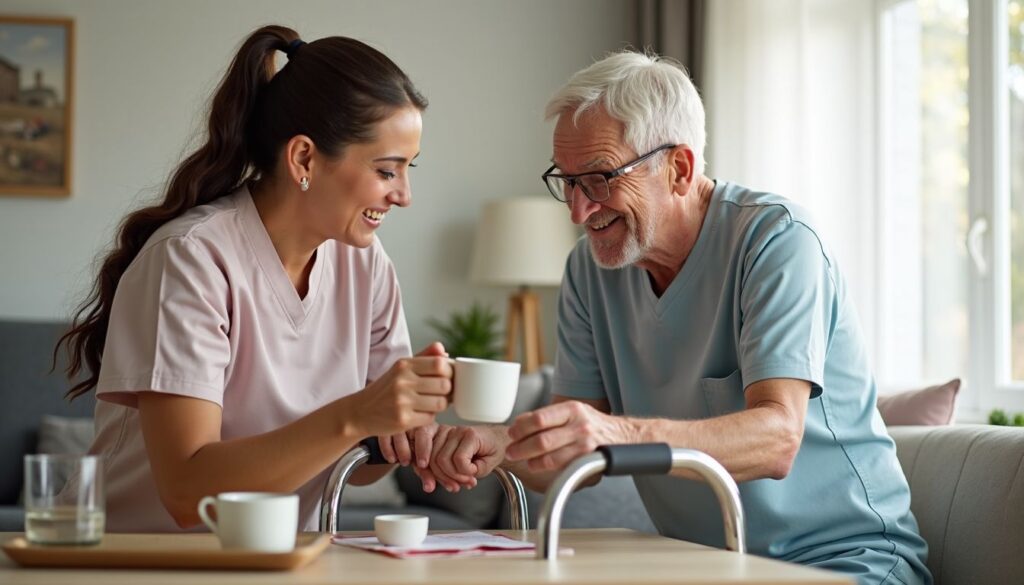
While equipment and home adjustments play a big part in senior independence, caregivers are the real bridge between safety and confidence. A supportive caregiver empowers older adults to do more on their own instead of doing everything for them.
a) Encourage, Don’t Take Over
It’s easy to step in and help when seniors struggle with simple tasks—but doing too much can unintentionally reduce their confidence. Instead, encourage them to do what they can safely. Offer help only when needed. For instance, if they’re using a walker, stand nearby for support rather than holding them.
If you haven’t already, check our detailed guide on How to Choose the Right Walker for Seniors—it can help caregivers pick the right mobility aid that promotes independence without risk.
b) Communication is Key
Always involve your loved ones in decision-making. Whether it’s rearranging the home or choosing assistive devices, let them express their comfort and preferences. This keeps them emotionally engaged and reinforces a sense of control.
For example, when choosing bathroom safety devices, discuss options together.
c) Provide Emotional Support
Emotional well-being is as crucial as physical safety. Listen to their stories, share laughter, and spend time together. Activities like light gardening, playing cards, or watching family photos can improve mood and reduce loneliness.
To explore ways to boost mental health in aging parents, you can refer to NIA’s resource on Emotional Wellness for Older Adults.
d) Educate Yourself as a Caregiver
Caregivers who stay informed can better handle daily challenges. Learn about mobility tools, dietary needs, and safety modifications. Reading senior-focused blogs like Senior Aid Tools regularly can keep you updated on the latest senior care innovations and tips.
Pro Tip: Empowerment starts with empathy. When caregivers focus on encouragement, communication, and emotional connection, seniors feel respected, capable, and truly independent.
Creating a Supportive, Independent Lifestyle

Helping seniors stay independent isn’t just about gadgets or home makeovers — it’s about creating an environment that balances safety, dignity, and emotional well-being. Small, thoughtful changes in daily life can make a big difference.
Start by building a safer home with non-slip flooring, proper lighting, and easy-to-reach essentials. Add comfort and support through assistive products like mobility scooters, shower chairs, and bedside commodes — these simple upgrades can transform daily struggles into effortless routines.
If you haven’t seen it yet, our detailed post on How to Create a Senior-Friendly Home offers a step-by-step guide to making your space safe and comfortable.
Encourage seniors to take small steps toward independence every day — like organizing their medication with a smart pill reminder device or using mobility tools confidently.
For caregivers, the key is balance: be supportive but let them lead. Celebrate every milestone, whether it’s walking unassisted or managing personal hygiene independently. These moments build lasting confidence.
For more practical tips, you can also explore trusted resources like AARP’s Home Safety Tips for Older Adults to keep your loved one’s living environment secure and comfortable.
Final Thought 💭
Empowerment doesn’t happen overnight — it’s a process built on trust, patience, and smart planning. With the right mix of care, communication, and adaptive tools, seniors can age gracefully and independently in the comfort of their own homes.


